
CPP-Notes
CPP Notes & RoadMaps for Coder, Programming Language, Software Engineering, Web, Backend, Distributed Infrastructure, DataScience & AI | 技术领域前瞻与程序员的进阶之路
Stars: 92

CPP-Notes is a comprehensive repository providing detailed insights into the history, evolution, and modern development of the C++ programming language. It covers the foundational concepts of C++ and its transition from C, highlighting key features such as object-oriented programming, generic programming, and modern enhancements introduced in C++11/14/17. The repository delves into the significance of C++ in system programming, library development, and its role as a versatile and efficient language. It explores the historical milestones of C++ development, from its inception in 1979 by Bjarne Stroustrup to the latest C++20 standard, showcasing major advancements like Concepts, Ranges library, Coroutines, Modules, and enhanced concurrency features.
README:
在线阅读 >>
代码案例(cpp-examples)
·
参考资料
C++ 是一种令人兴奋的语言,它在 C 语言的基础 上添加了对面向对象编程和泛型编程的支持,在 20 世纪 90 年代便是最重要的编程语言之一,并在 21 世纪仍保持强劲势头。C++继承了 C 语言高 效、简洁、快速和可移植性的传统。C++ 1x (C++11/14, 甚至 C++17) 为传统 C++ 注入的大量特性使得整个 C++ 变得更加像一门现代化的语言。C++1x 不仅仅增强了 C++ 语言自身的可用性,auto 关键字语义的修改使得我们更加有信心来操控极度复杂的模板类型。同时还对语言运行期进行了大量的强化,Lambda 表达式的出现让 C++ 具有了几乎在现代的编程语言中已经司空见惯的匿名函数的闭包特性,右值引用的出现解决了 C++ 长期以来被人诟病的临时对象效率问题等等。C++ 1x 为自身的标准库增加了非常多的工具和方法,诸如在语言层面上提供了 std::thread 支持了并发编程,在不同平台上不再依赖于系统底层的 API,实现了语言层面的跨平台支持;std::regex 提供了完整的正则表达式支持等等。C++98 已经被实践证明了是一种非常成功的范型,而 C++ 1x 的出现,则进一步推动这种范型,让 C++ 成为系统程序设计和库开发更好的语言。
-
C++ 编程语言的历史可以追溯到 1979 年,当时 Bjarne Stroustrup 为博士学位论文进行了一些开发。在 Stroustrup 可以使用的所有语言中,有一种被称为 Simula 的语言,顾名思义,它可能是一种主要为仿真而设计的语言。Simula 67 语言是 Stroustrup 使用的变体,被认为是支持面向对象编程范例的主要语言。Stroustrup 发现这种范例对包装开发很有帮助。但是,Simula 语言对于实践和实际使用而言太慢了。随后不久,Bjarne Stroustrup 希望通过支持面向对象范例来增强 C。他深入研究了 Smalltalk 的 OO 实现,以获取有关实现的想法。但是他不愿意为此放弃性能,因此他开始从事 “C with Classes (带有类的 C)” 的工作,希望 C++ 代码运行时应具有与 C 代码相似(或更好)的性能。
-
1983 年,语言的名称从 “带有类的 C” 更改为 C++。C 语言中的 ++ 运算符是用于递增变量的运算符,它使您可以深入了解 Stroustrup 如何看待该语言。在此期间添加了许多新功能,其中最引人注目的是虚函数,函数重载,带有&符号的引用,const 关键字和使用两个正斜杠的单行注释。
-
1985 年,Stroustrup 出版了名为*“C++ 编程语言” 的书籍*。同年,C++ 被实现为商业产品。该语言尚未正式标准化,因此使该书成为非常重要的参考。该语言在 1989 年再次进行了更新,以包括受保护的成员和静态成员,以及从多个类的继承。
-
1990 年,发行了*《带注释的 C++ 参考手册*》。同年,Borland 的 Turbo C++ 编译器将作为商业产品发布。Turbo C++ 添加了许多其他库,这些库会对 C++ 的开发产生相当大的影响。尽管 Turbo C++ 的最后一个稳定版本是 2006 年,但该编译器仍被广泛使用。
-
1998 年,C++ 标准委员会发布了第一个 C++ ISO / IEC 14882:1998 国际标准,其非正式名称为 C++ 98。据说*《带注释的 C++ 参考手册》*对标准的制定产生了很大的影响。还包括标准模板库,该模板库于 1979 年开始概念开发。2003 年,该委员会对 1998 年标准所报告的多个问题做出了回应,并对其进行了相应的修订。更改的语言称为 C++ 03。
-
2005 年,C++ 标准委员会发布了一份技术报告(称为 TR1),详细介绍了他们计划添加到最新 C++ 标准中的各种功能。新标准被非正式地称为 C++ 0x,因为它有望在第一个十年结束之前的某个时间发布。具有讽刺意味的是,新标准要到 2011 年年中才会发布。直到那时为止,已经发布了几份技术报告,并且一些编译器开始为新功能添加实验性支持。
-
2011 年中,新的 C++ 标准(称为 C++ 11)完成。Boost 库项目对新标准产生了重大影响,其中一些新模块直接来自相应的 Boost 库。一些新功能包括正则表达式支持,全面的随机化库,新的 C++ 时间库,原子支持,标准线程库 ,一种新的 for 循环语法,提供的功能类似于某些其他语言中的 foreach 循环,auto 关键字,新的容器类,对联合和数组初始化列表以及可变参数模板的更好支持。
-
2014 年,C++ 14(也称为 C++ 1y)作为 C++11 的一个小扩展发布,主要功能是错误修复和小的改进,国际标准投票程序草案于 2014 年 8 月中完成,加强 lambda 函数,constexpr 和类型推导特性。
-
2017 年,发布 C++ 17 标准,C++ 17 提供了很多东西。增强了核心语言和库。
-
2020 年,发布 C++20 标准,推出了很多重量级功能,其中比较重要的有:
- Concepts:概念改变了我们思考和编程模板的方式。它们是模板参数的语义类别。它们使您可以直接在类型系统中表达您的意图。如果出了什么问题,您会收到清晰的错误消息。
- Ranges library:新的 ranges 库使它可以直接在容器上执行算法,用管道符号组成算法,并将其应用于无限数据流。
- Coroutines:由于协程,C++ 中的异步编程成为主流。协程是协作任务,事件循环,无限数据流或管道的基础。
- Modules:模块克服了头文件的限制。头文件和源文件的分离变得和预处理器一样过时了。最后,我们有更快的构建时间和更轻松的构建软件包的方法。
- Concurrency:Atomic Smart Pointers, Joining & Cancellable Threads,The C20 Synchronization Library,增强了 C++ 并发编程能力;
- https://www.cnblogs.com/QG-whz/category/685776.html?page=2
- http://c.biancheng.net/view/vip_2242.html,https://www.zhihu.com/column/c_1635193783049568256
笔者所有文章遵循知识共享 署名 - 非商业性使用 - 禁止演绎 4.0 国际许可协议,欢迎转载,尊重版权。您还可以前往 NGTE Books 主页浏览包含知识体系、编程语言、软件工程、模式与架构、Web 与大前端、服务端开发实践与工程架构、分布式基础架构、人工智能与深度学习、产品运营与创业等多类目的书籍列表:
For Tasks:
Click tags to check more tools for each tasksFor Jobs:
Alternative AI tools for CPP-Notes
Similar Open Source Tools

CPP-Notes
CPP-Notes is a comprehensive repository providing detailed insights into the history, evolution, and modern development of the C++ programming language. It covers the foundational concepts of C++ and its transition from C, highlighting key features such as object-oriented programming, generic programming, and modern enhancements introduced in C++11/14/17. The repository delves into the significance of C++ in system programming, library development, and its role as a versatile and efficient language. It explores the historical milestones of C++ development, from its inception in 1979 by Bjarne Stroustrup to the latest C++20 standard, showcasing major advancements like Concepts, Ranges library, Coroutines, Modules, and enhanced concurrency features.
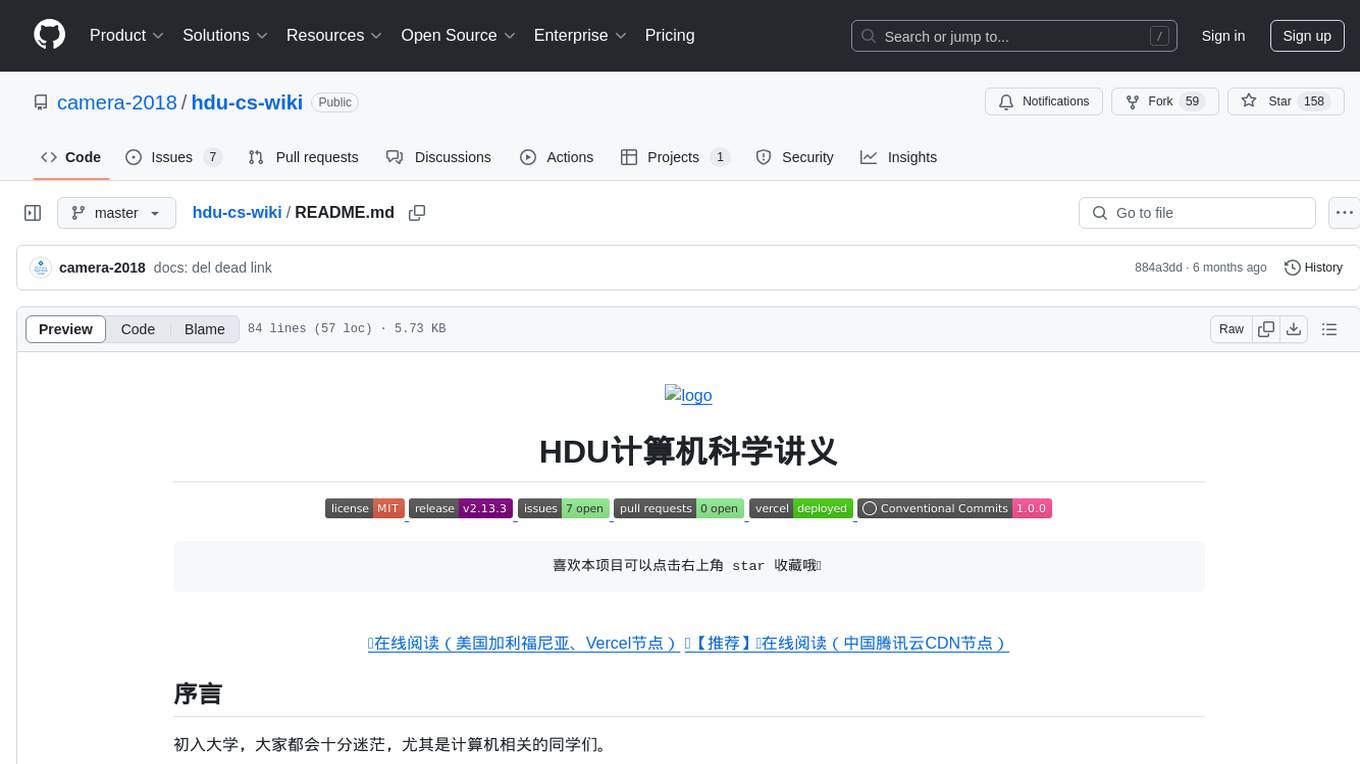
hdu-cs-wiki
The HDU Computer Science Lecture Notes is a comprehensive guide designed to help students navigate through various challenges in the field of computer science. It covers topics such as programming languages, artificial intelligence, software development, and more. The notes provide insights on how to effectively utilize university time, balance grades with project experience, and make informed decisions regarding career paths. Created by a collaborative effort involving students, teachers, and industry experts, the lecture notes aim to serve as a guiding tool for individuals seeking guidance in the computer science domain.
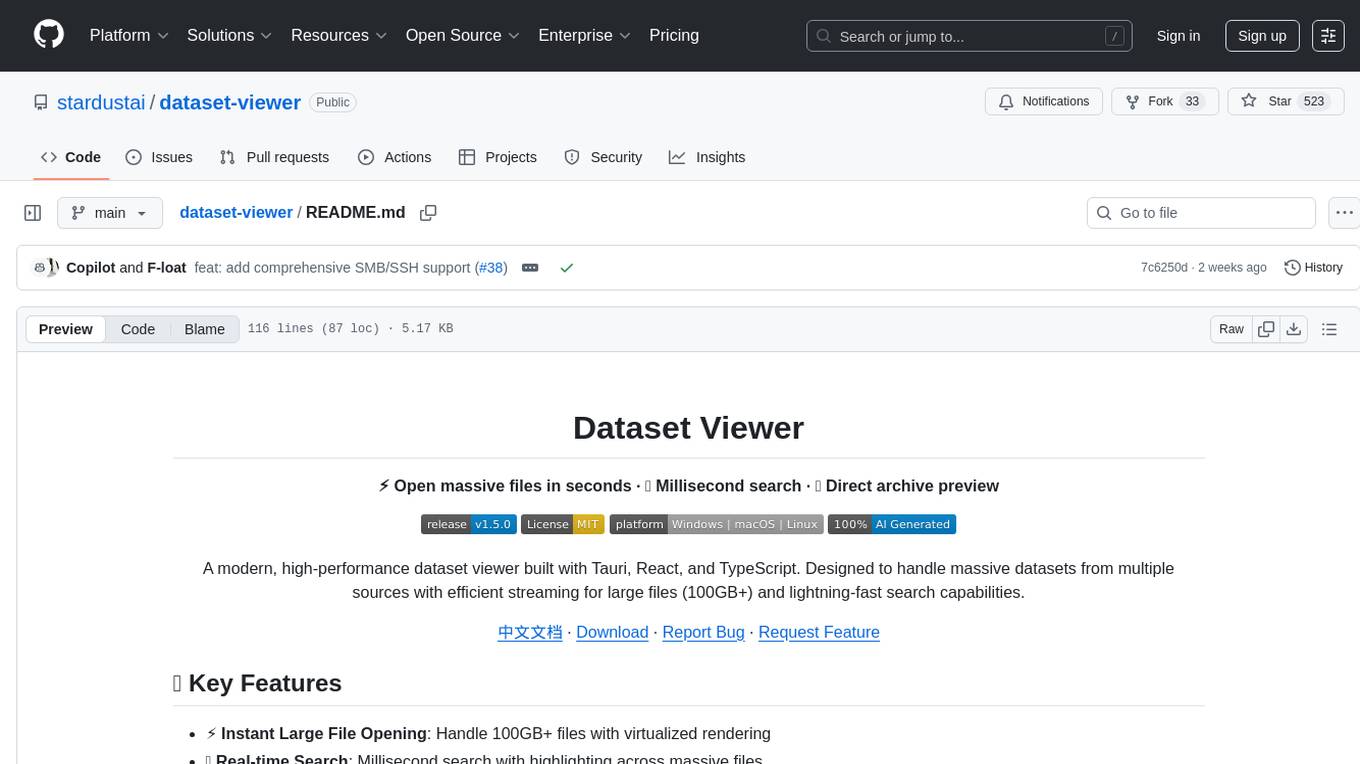
dataset-viewer
Dataset Viewer is a modern, high-performance tool built with Tauri, React, and TypeScript, designed to handle massive datasets from multiple sources with efficient streaming for large files (100GB+) and lightning-fast search capabilities. It supports instant large file opening, real-time search, direct archive preview, multi-protocol and multi-format support, and features a modern interface with dark/light themes and responsive design. The tool is perfect for data scientists, log analysis, archive management, remote access, and performance-critical tasks.
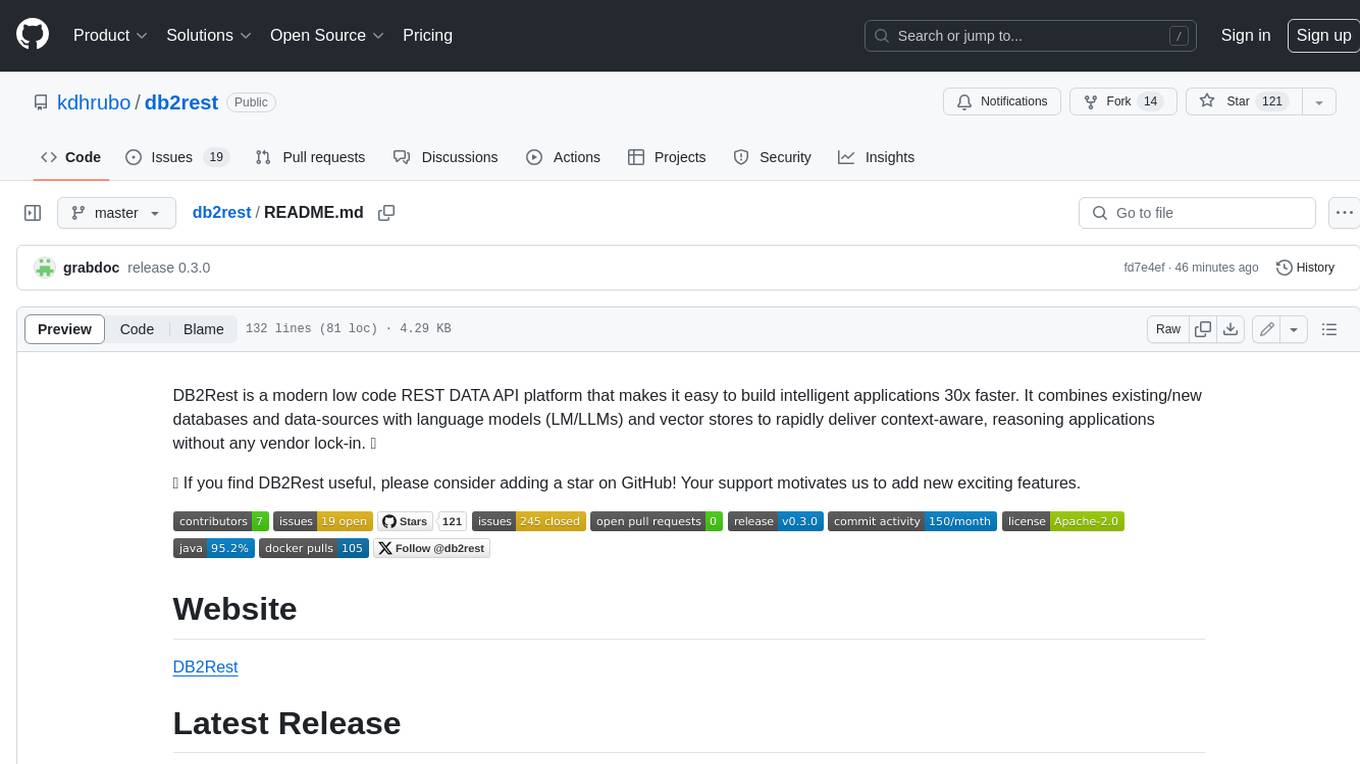
db2rest
DB2Rest is a modern low-code REST DATA API platform that simplifies the development of intelligent applications. It seamlessly integrates existing and new databases with language models (LMs/LLMs) and vector stores, enabling the rapid delivery of context-aware, reasoning applications without vendor lock-in.
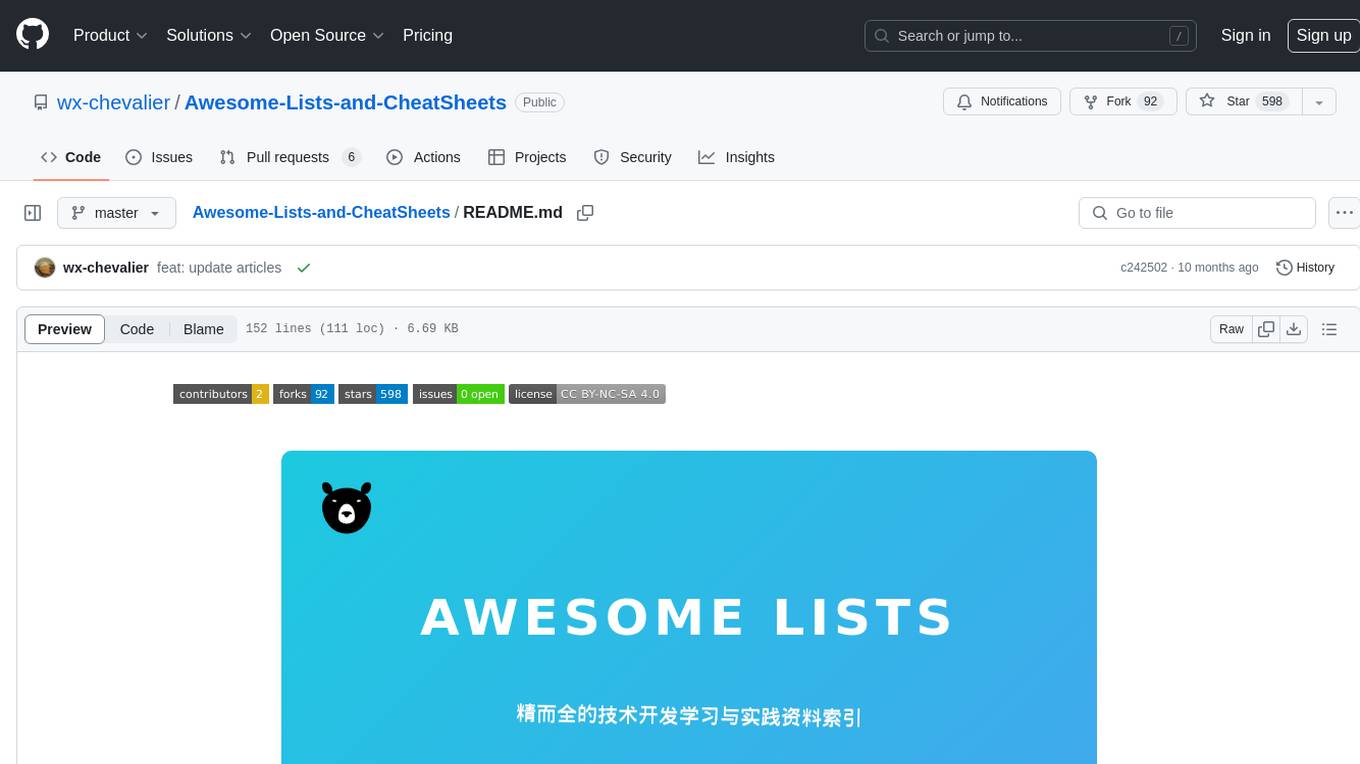
Awesome-Lists-and-CheatSheets
Awesome-Lists is a curated index of selected resources spanning various fields including programming languages and theories, web and frontend development, server-side development and infrastructure, cloud computing and big data, data science and artificial intelligence, product design, etc. It includes articles, books, courses, examples, open-source projects, and more. The repository categorizes resources according to the knowledge system of different domains, aiming to provide valuable and concise material indexes for readers. Users can explore and learn from a wide range of high-quality resources in a systematic way.
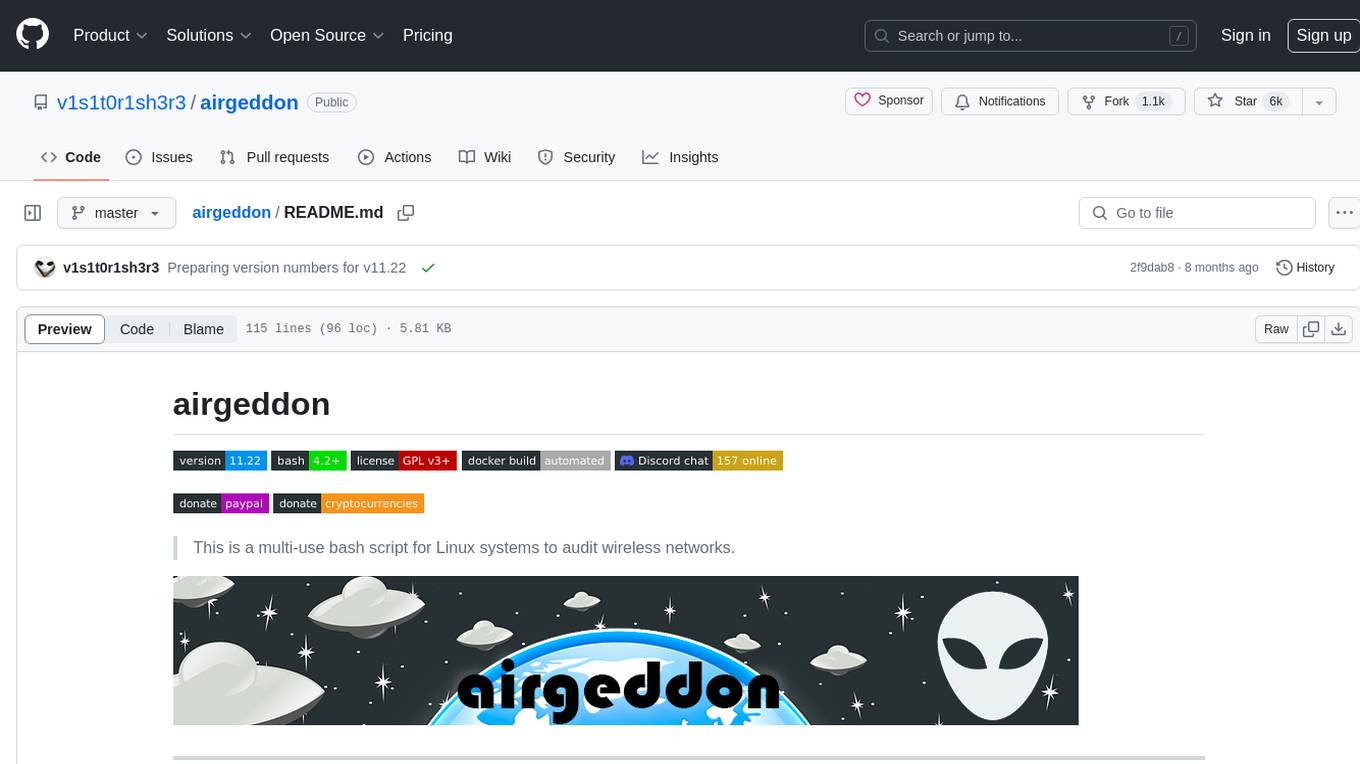
airgeddon
Airgeddon is a versatile bash script designed for Linux systems to conduct wireless network audits. It provides a comprehensive set of features and tools for auditing and securing wireless networks. The script is user-friendly and offers functionalities such as scanning, capturing handshakes, deauth attacks, and more. Airgeddon is regularly updated and supported, making it a valuable tool for both security professionals and enthusiasts.
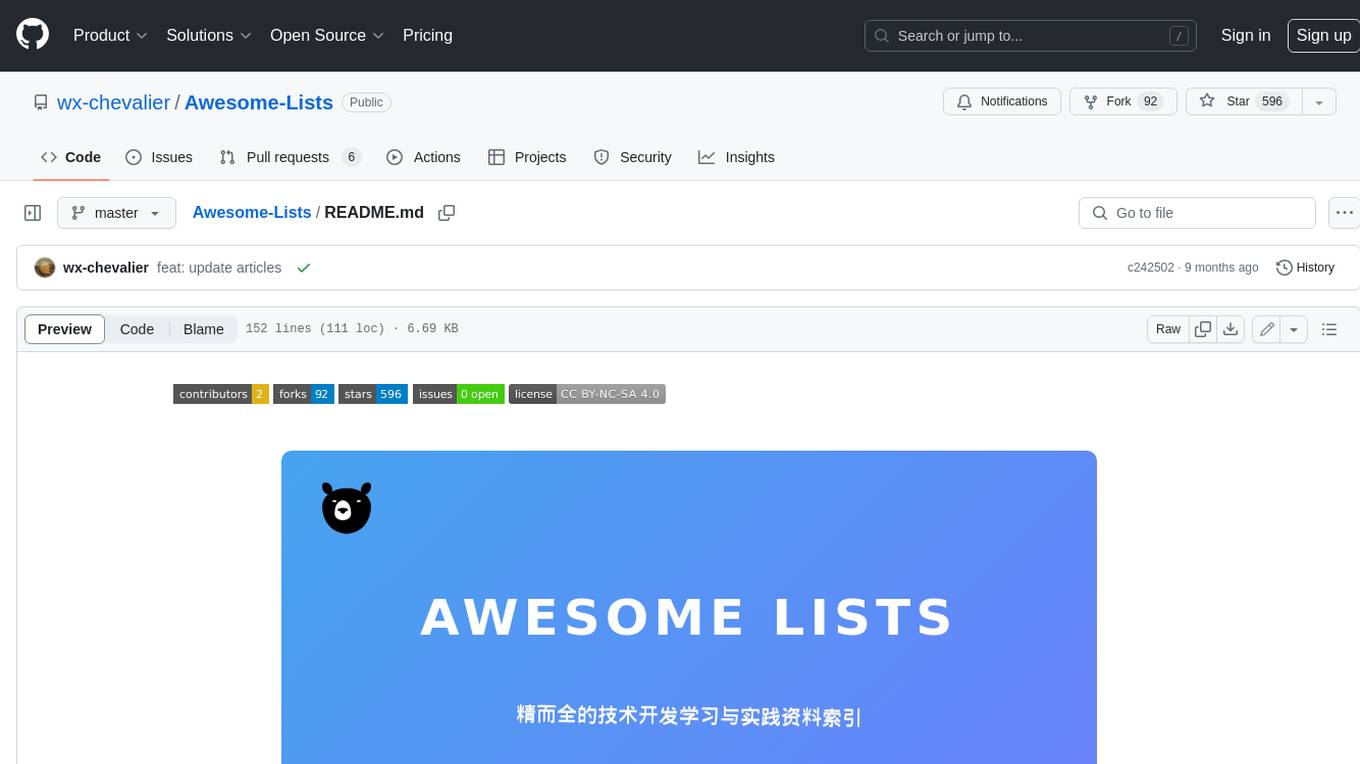
Awesome-Lists
Awesome-Lists is a curated list of awesome lists across various domains of computer science and beyond, including programming languages, web development, data science, and more. It provides a comprehensive index of articles, books, courses, open source projects, and other resources. The lists are organized by topic and subtopic, making it easy to find the information you need. Awesome-Lists is a valuable resource for anyone looking to learn more about a particular topic or to stay up-to-date on the latest developments in the field.
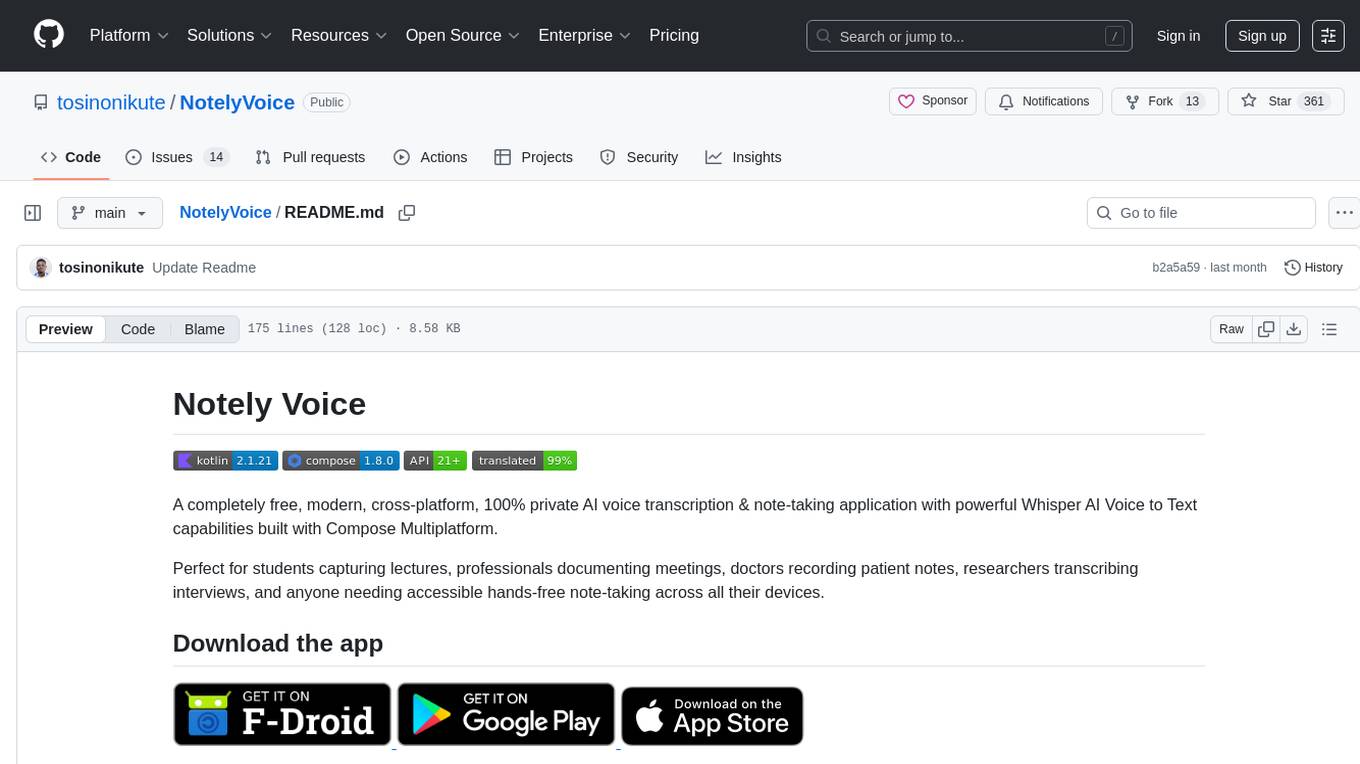
NotelyVoice
Notely Voice is a free, modern, cross-platform AI voice transcription and note-taking application. It offers powerful Whisper AI Voice to Text capabilities, making it ideal for students, professionals, doctors, researchers, and anyone in need of hands-free note-taking. The app features rich text editing, simple search, smart filtering, organization with folders and tags, advanced speech-to-text, offline capability, seamless integration, audio recording, theming, cross-platform support, and sharing functionality. It includes memory-efficient audio processing, chunking configuration, and utilizes OpenAI Whisper for speech recognition technology. Built with Kotlin, Compose Multiplatform, Coroutines, Android Architecture, ViewModel, Koin, Material 3, Whisper AI, and Native Compose Navigation, Notely follows Android Architecture principles with distinct layers for UI, presentation, domain, and data.
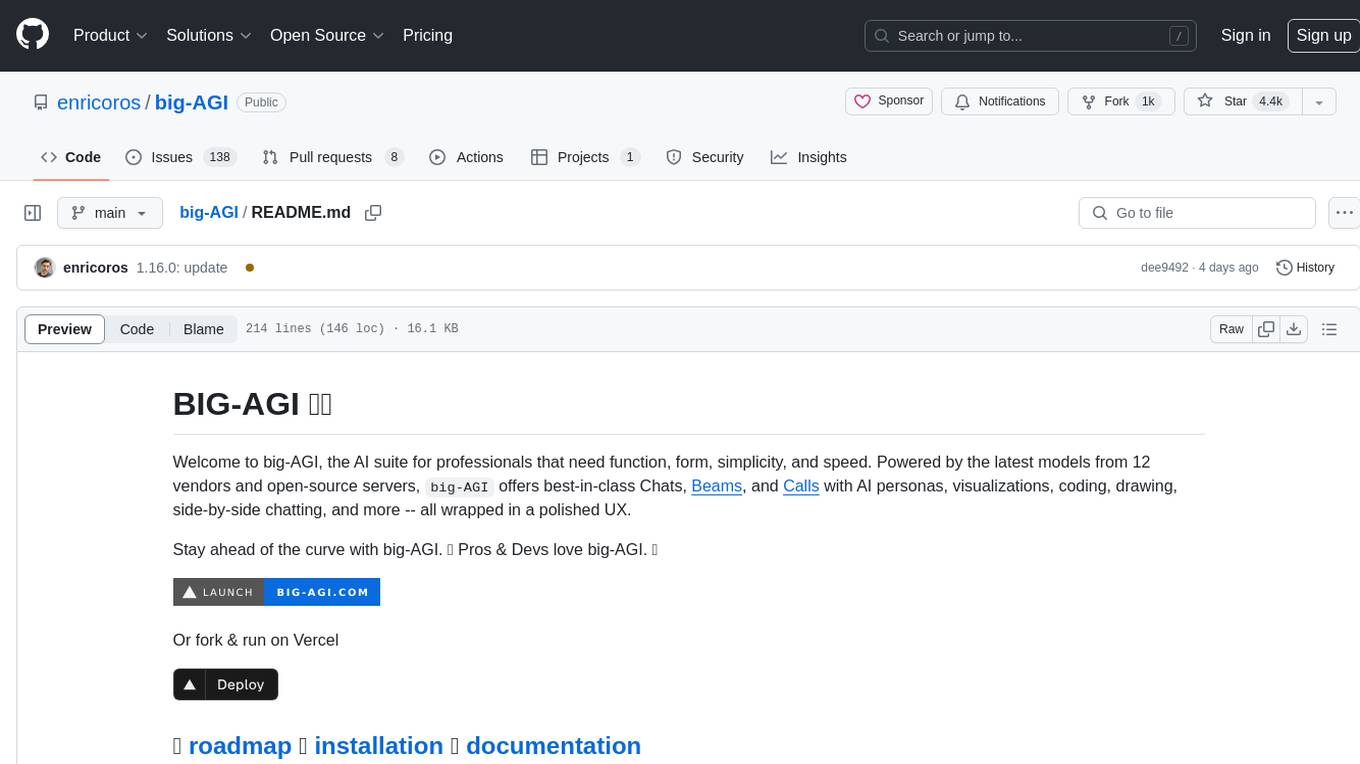
big-AGI
big-AGI is an AI suite designed for professionals seeking function, form, simplicity, and speed. It offers best-in-class Chats, Beams, and Calls with AI personas, visualizations, coding, drawing, side-by-side chatting, and more, all wrapped in a polished UX. The tool is powered by the latest models from 12 vendors and open-source servers, providing users with advanced AI capabilities and a seamless user experience. With continuous updates and enhancements, big-AGI aims to stay ahead of the curve in the AI landscape, catering to the needs of both developers and AI enthusiasts.
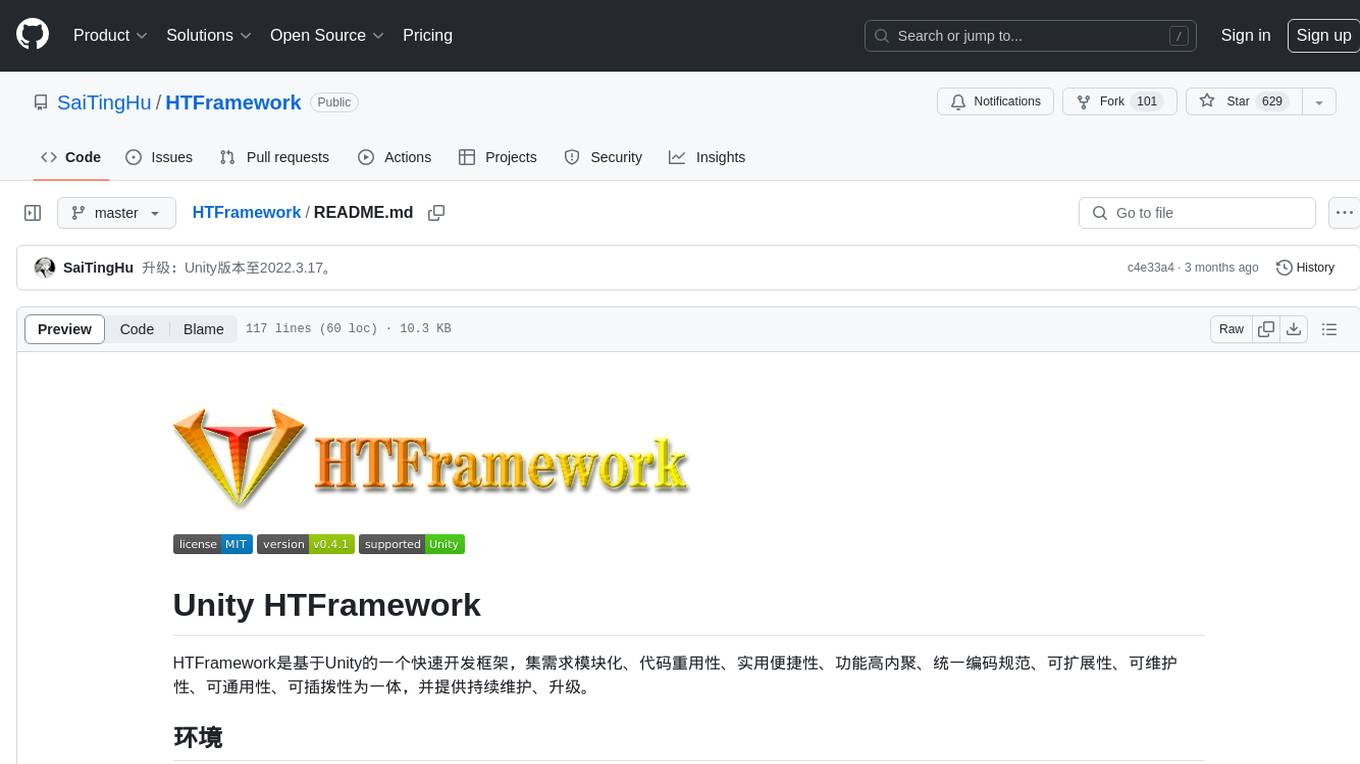
HTFramework
HTFramework is a rapid development framework based on Unity, integrating modular requirements, code reusability, practicality, high cohesion, unified coding standards, extensibility, maintainability, generality, and pluggability. It provides continuous maintenance and upgrades. The framework includes modules for aspect-oriented program code tracking, audio management, controller simplification, coroutine scheduling, custom modules, custom datasets, debugging, entity-component-system, entity management, event handling, exception handling, finite state machines, hotfixing, input management, instruction system, main module access, network client, object pooling, procedures, reference pooling, resource loading, step editing, task editing, UI management, utility tools, web requests, and optional AI, ILRuntime-based hotfixing, XLua integration, and game component modules.
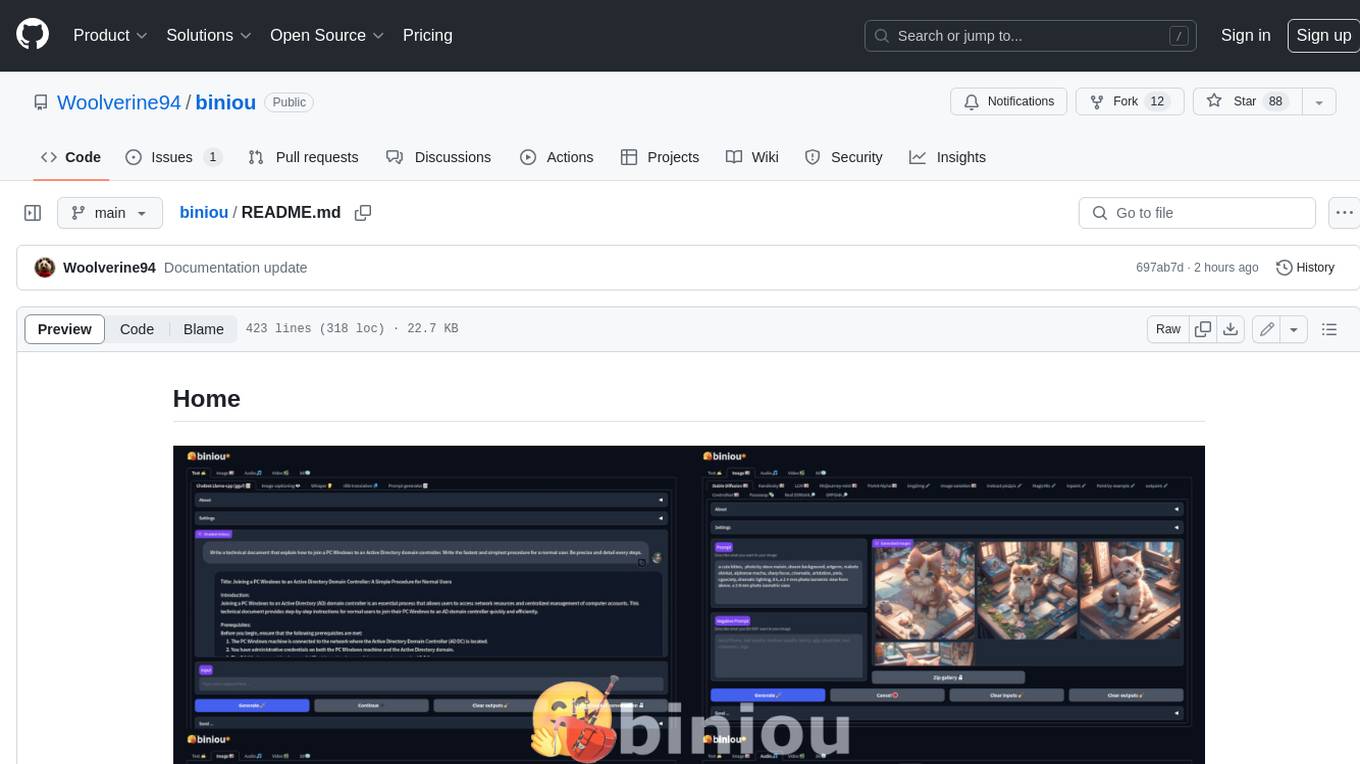
biniou
biniou is a self-hosted webui for various GenAI (generative artificial intelligence) tasks. It allows users to generate multimedia content using AI models and chatbots on their own computer, even without a dedicated GPU. The tool can work offline once deployed and required models are downloaded. It offers a wide range of features for text, image, audio, video, and 3D object generation and modification. Users can easily manage the tool through a control panel within the webui, with support for various operating systems and CUDA optimization. biniou is powered by Huggingface and Gradio, providing a cross-platform solution for AI content generation.
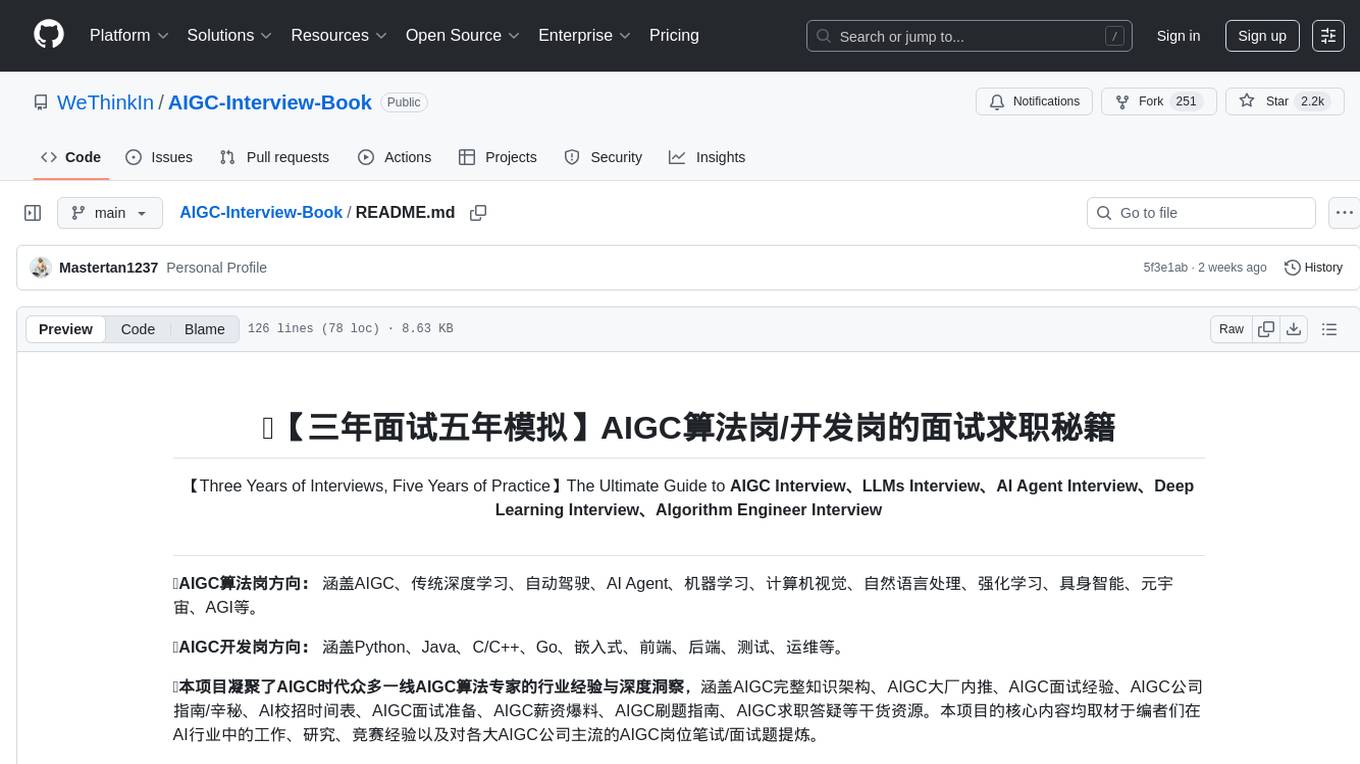
AIGC-Interview-Book
AIGC-Interview-Book is the ultimate guide for AIGC algorithm and development job interviews, covering a wide range of topics such as AIGC, traditional deep learning, autonomous driving, AI agent, machine learning, computer vision, natural language processing, reinforcement learning, embodied intelligence, metaverse, AGI, Python, Java, C/C++, Go, embedded systems, front-end, back-end, testing, and operations. The repository consolidates industry experience and insights from frontline AIGC algorithm experts, providing resources on AIGC knowledge framework, internal referrals at AIGC big companies, interview experiences, company guides, AI campus recruitment schedule, interview preparation, salary insights, coding guide, and job-seeking Q&A. It serves as a valuable resource for AIGC-related professionals, students, and job seekers, offering insights and guidance for career advancement and job interviews in the AIGC field.
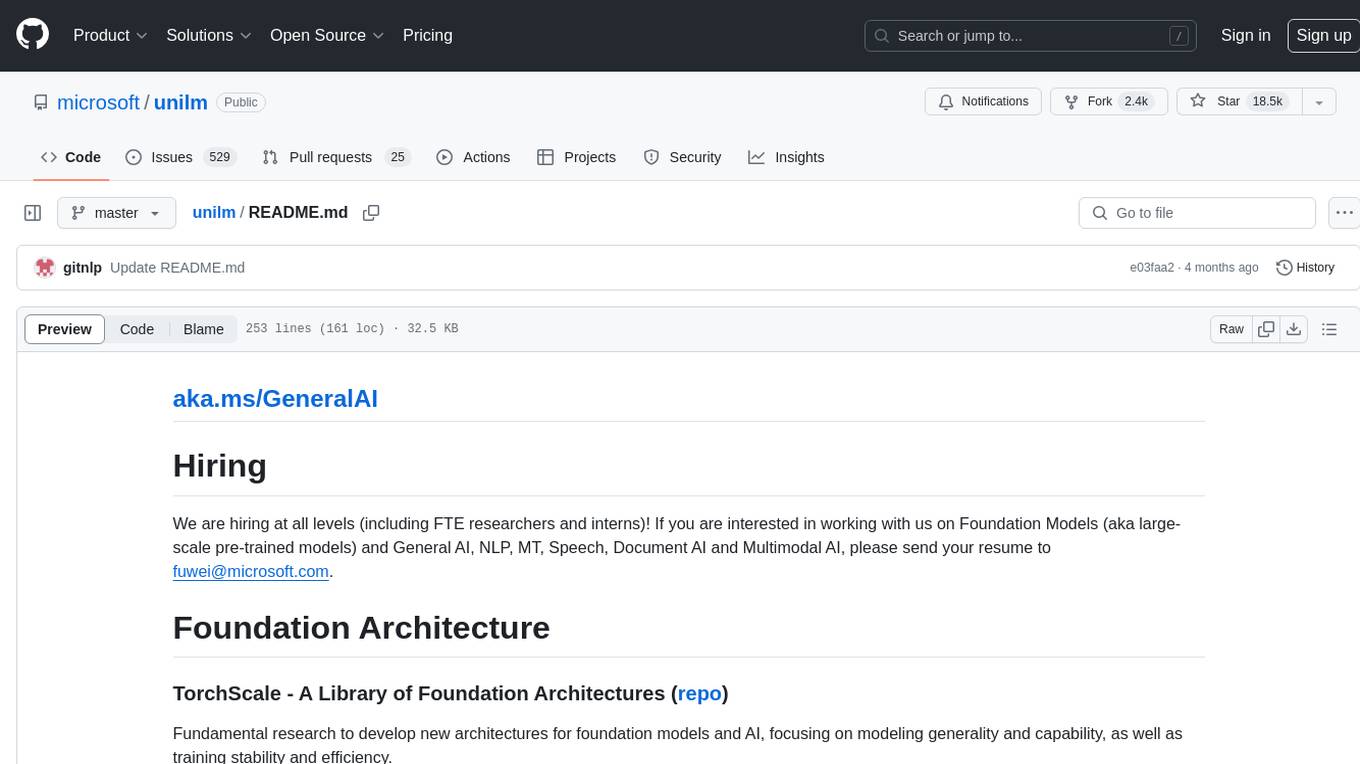
unilm
The 'unilm' repository is a collection of tools, models, and architectures for Foundation Models and General AI, focusing on tasks such as NLP, MT, Speech, Document AI, and Multimodal AI. It includes various pre-trained models, such as UniLM, InfoXLM, DeltaLM, MiniLM, AdaLM, BEiT, LayoutLM, WavLM, VALL-E, and more, designed for tasks like language understanding, generation, translation, vision, speech, and multimodal processing. The repository also features toolkits like s2s-ft for sequence-to-sequence fine-tuning and Aggressive Decoding for efficient sequence-to-sequence decoding. Additionally, it offers applications like TrOCR for OCR, LayoutReader for reading order detection, and XLM-T for multilingual NMT.
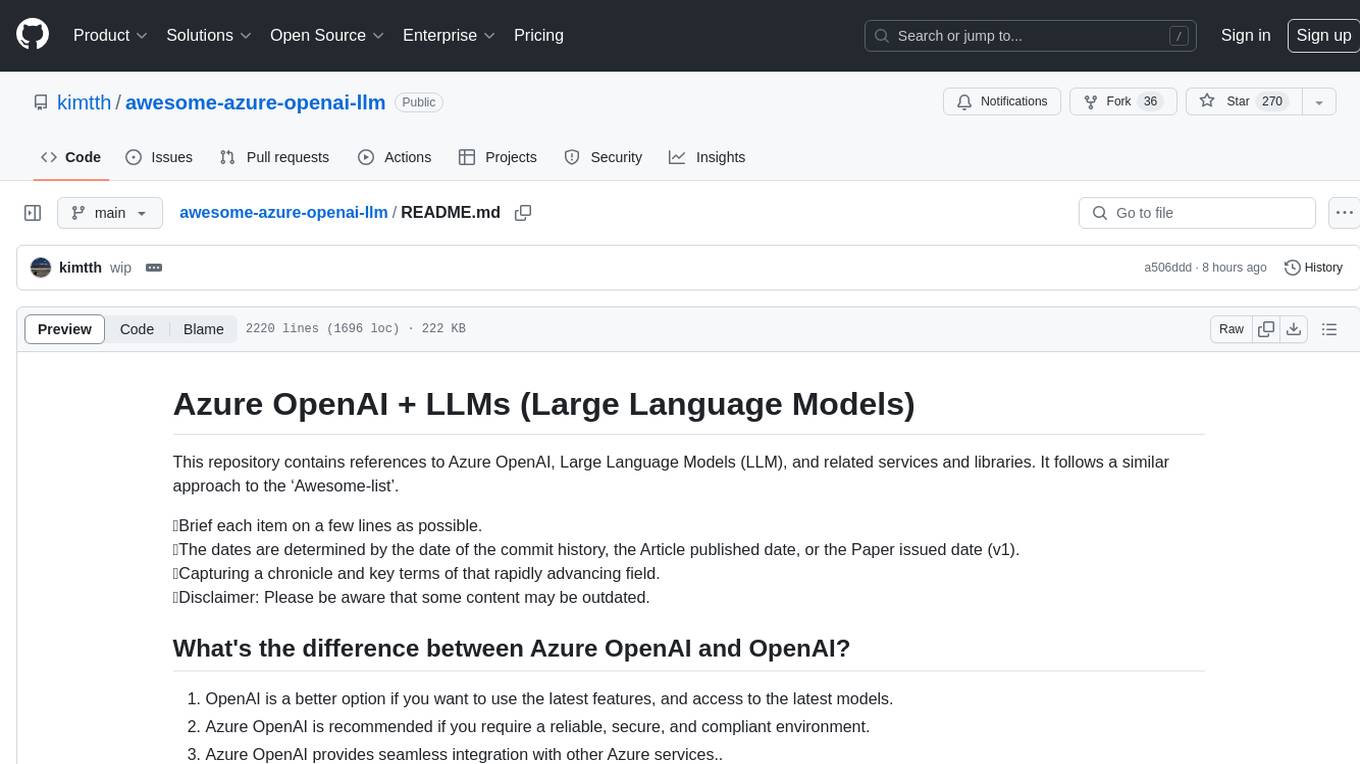
awesome-azure-openai-llm
This repository is a collection of references to Azure OpenAI, Large Language Models (LLM), and related services and libraries. It provides information on various topics such as RAG, Azure OpenAI, LLM applications, agent design patterns, semantic kernel, prompting, finetuning, challenges & abilities, LLM landscape, surveys & references, AI tools & extensions, datasets, and evaluations. The content covers a wide range of topics related to AI, machine learning, and natural language processing, offering insights into the latest advancements in the field.
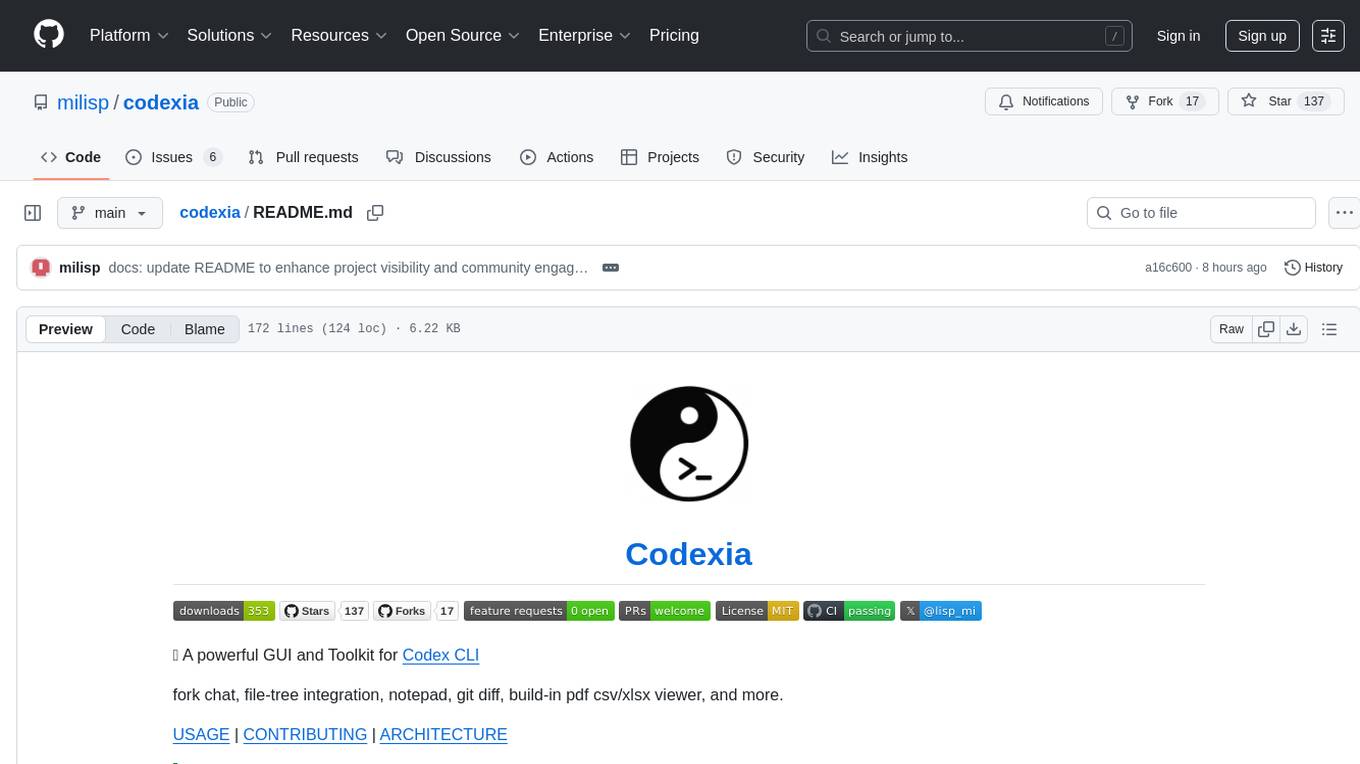
codexia
Codexia is a powerful GUI and Toolkit for Codex CLI, offering features like fork chat, file-tree integration, notepad, git diff, built-in pdf/csv/xlsx viewer, and more. It provides multi-file format support, flexible configuration with multiple AI providers, professional UX with responsive UI, security features like sandbox execution modes, and prioritizes privacy. The tool supports interactive chat, code generation/editing, file operations with sandbox, command execution with approval, multiple AI providers, project-aware assistance, streaming responses, and built-in web search. The roadmap includes plans for MCP tool call, more file format support, better UI customization, plugin system, real-time collaboration, performance optimizations, and token count.
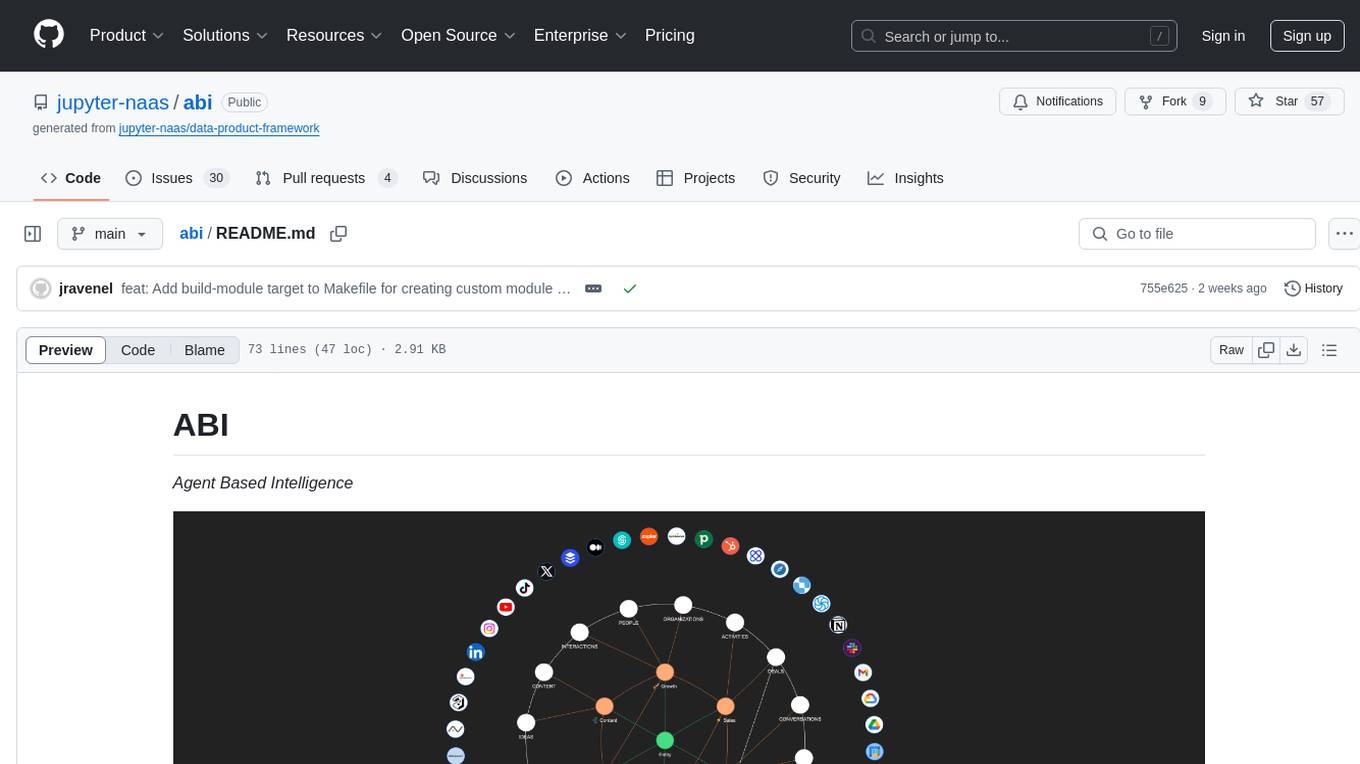
abi
ABI (Agentic Brain Infrastructure) is a Python-based AI Operating System designed to serve as the core infrastructure for building an Agentic AI Ontology Engine. It empowers organizations to integrate, manage, and scale AI-driven operations with multiple AI models, focusing on ontology, agent-driven workflows, and analytics. ABI emphasizes modularity and customization, providing a customizable framework aligned with international standards and regulatory frameworks. It offers features such as configurable AI agents, ontology management, integrations with external data sources, data processing pipelines, workflow automation, analytics, and data handling capabilities.
For similar tasks

CPP-Notes
CPP-Notes is a comprehensive repository providing detailed insights into the history, evolution, and modern development of the C++ programming language. It covers the foundational concepts of C++ and its transition from C, highlighting key features such as object-oriented programming, generic programming, and modern enhancements introduced in C++11/14/17. The repository delves into the significance of C++ in system programming, library development, and its role as a versatile and efficient language. It explores the historical milestones of C++ development, from its inception in 1979 by Bjarne Stroustrup to the latest C++20 standard, showcasing major advancements like Concepts, Ranges library, Coroutines, Modules, and enhanced concurrency features.
For similar jobs
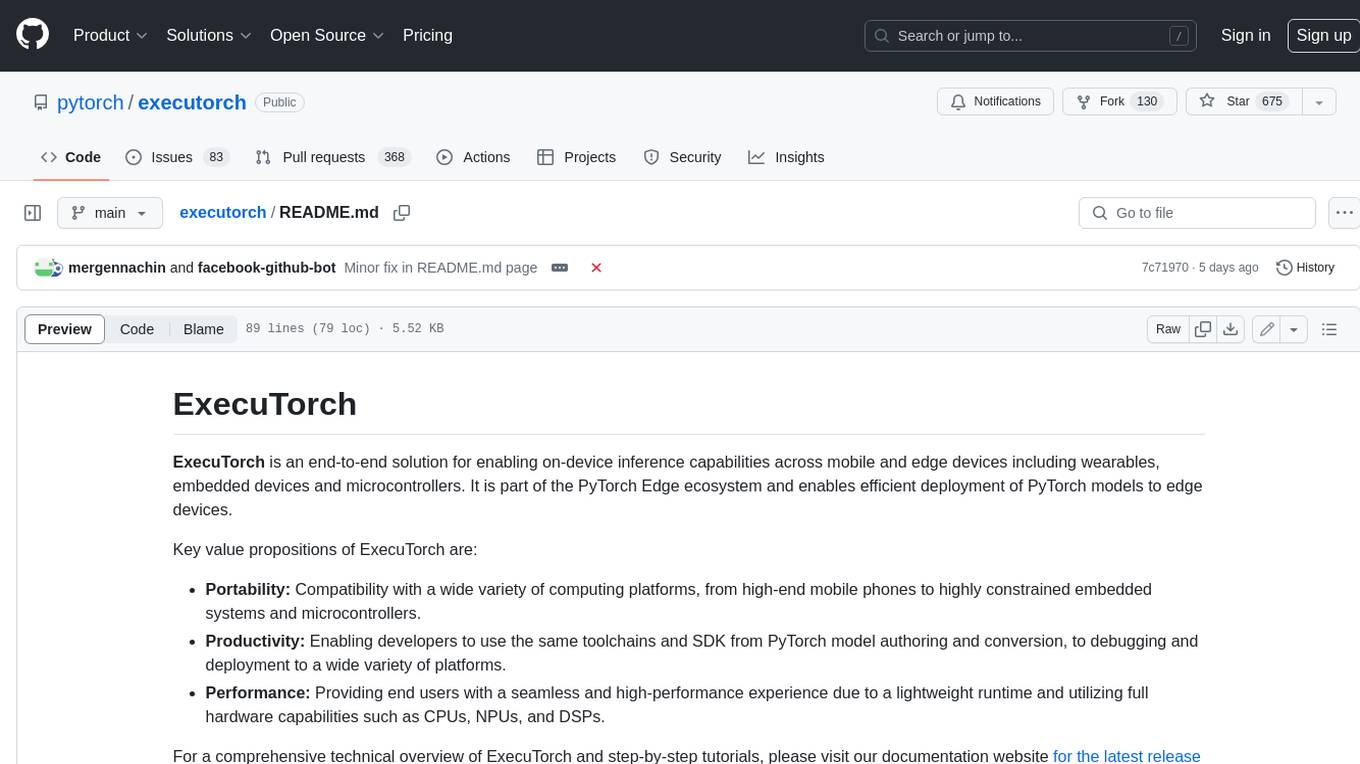
executorch
ExecuTorch is an end-to-end solution for enabling on-device inference capabilities across mobile and edge devices including wearables, embedded devices and microcontrollers. It is part of the PyTorch Edge ecosystem and enables efficient deployment of PyTorch models to edge devices. Key value propositions of ExecuTorch are: * **Portability:** Compatibility with a wide variety of computing platforms, from high-end mobile phones to highly constrained embedded systems and microcontrollers. * **Productivity:** Enabling developers to use the same toolchains and SDK from PyTorch model authoring and conversion, to debugging and deployment to a wide variety of platforms. * **Performance:** Providing end users with a seamless and high-performance experience due to a lightweight runtime and utilizing full hardware capabilities such as CPUs, NPUs, and DSPs.
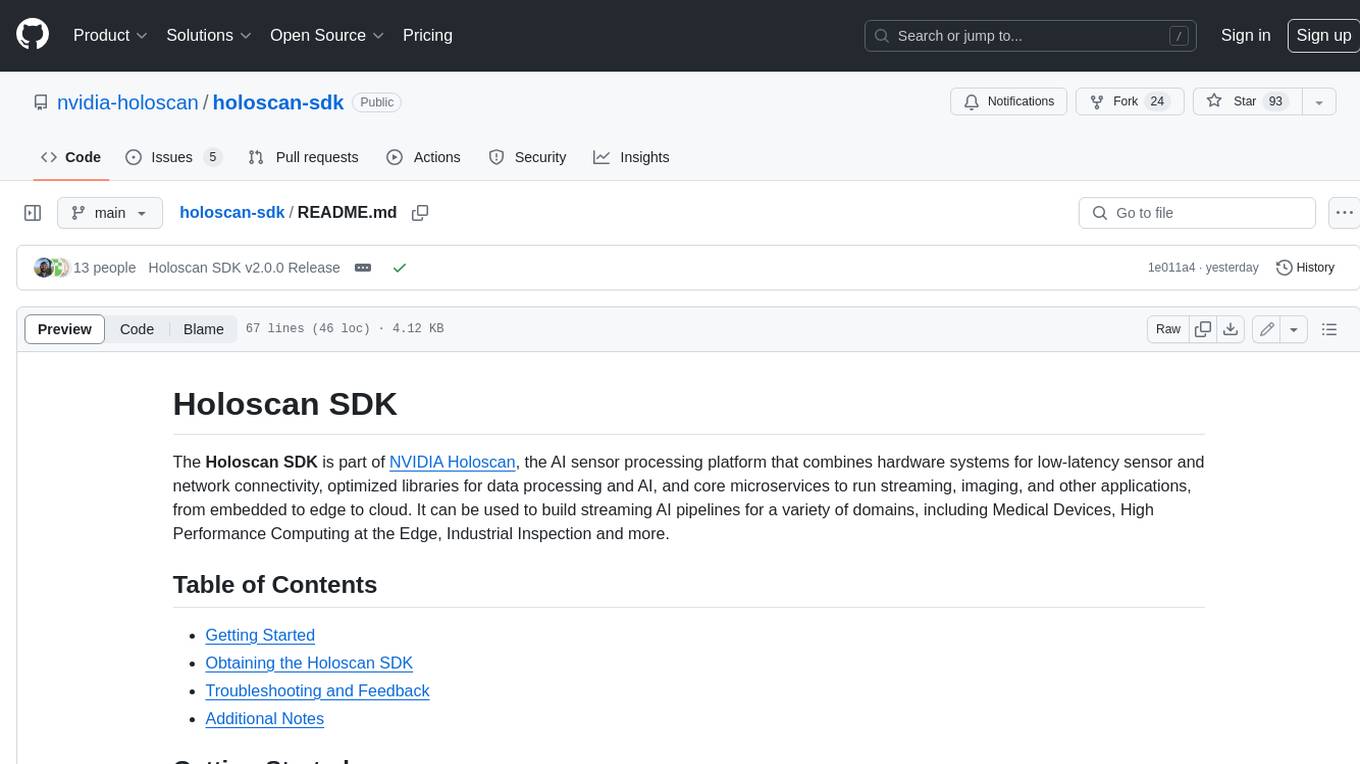
holoscan-sdk
The Holoscan SDK is part of NVIDIA Holoscan, the AI sensor processing platform that combines hardware systems for low-latency sensor and network connectivity, optimized libraries for data processing and AI, and core microservices to run streaming, imaging, and other applications, from embedded to edge to cloud. It can be used to build streaming AI pipelines for a variety of domains, including Medical Devices, High Performance Computing at the Edge, Industrial Inspection and more.
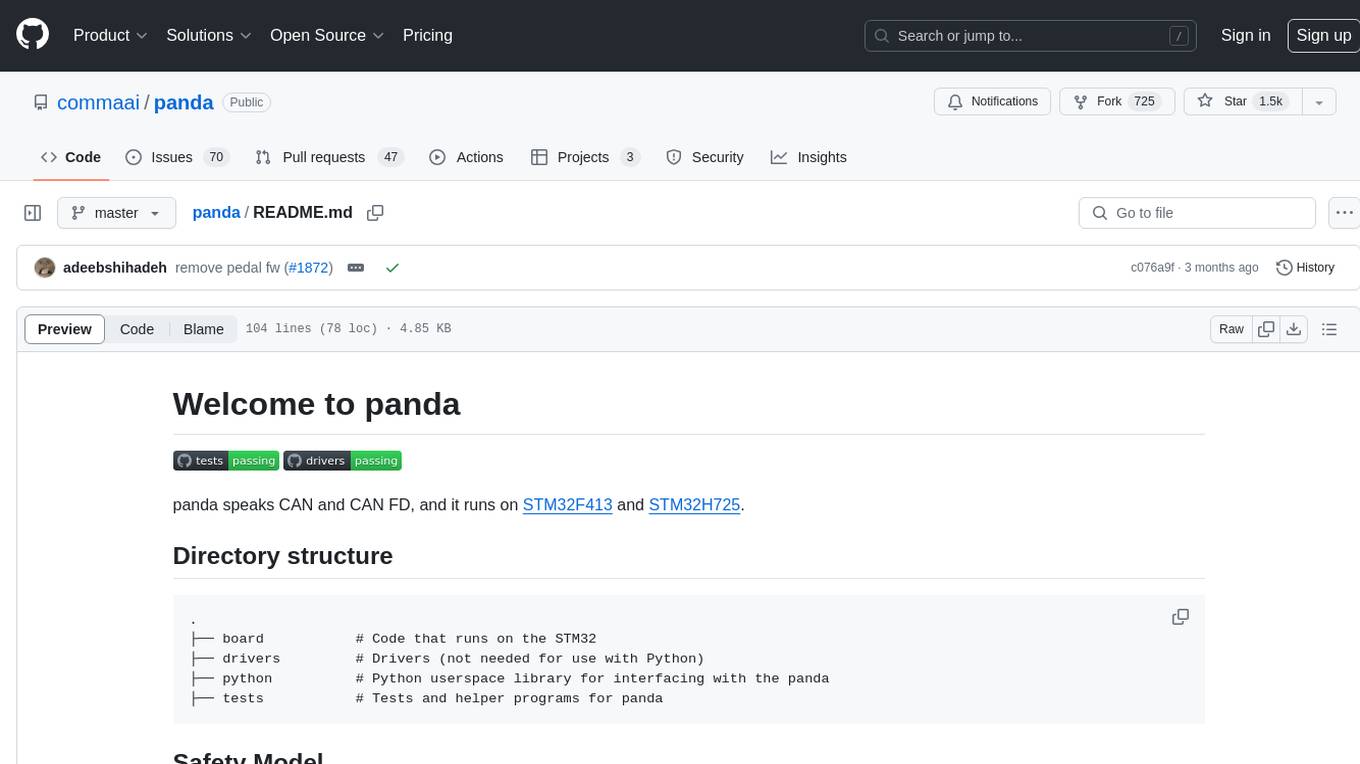
panda
Panda is a car interface tool that speaks CAN and CAN FD, running on STM32F413 and STM32H725. It provides safety modes and controls_allowed feature for message handling. The tool ensures code rigor through CI regression tests, including static code analysis, MISRA C:2012 violations check, unit tests, and hardware-in-the-loop tests. The software interface supports Python library, C++ library, and socketcan in kernel. Panda is licensed under the MIT license.
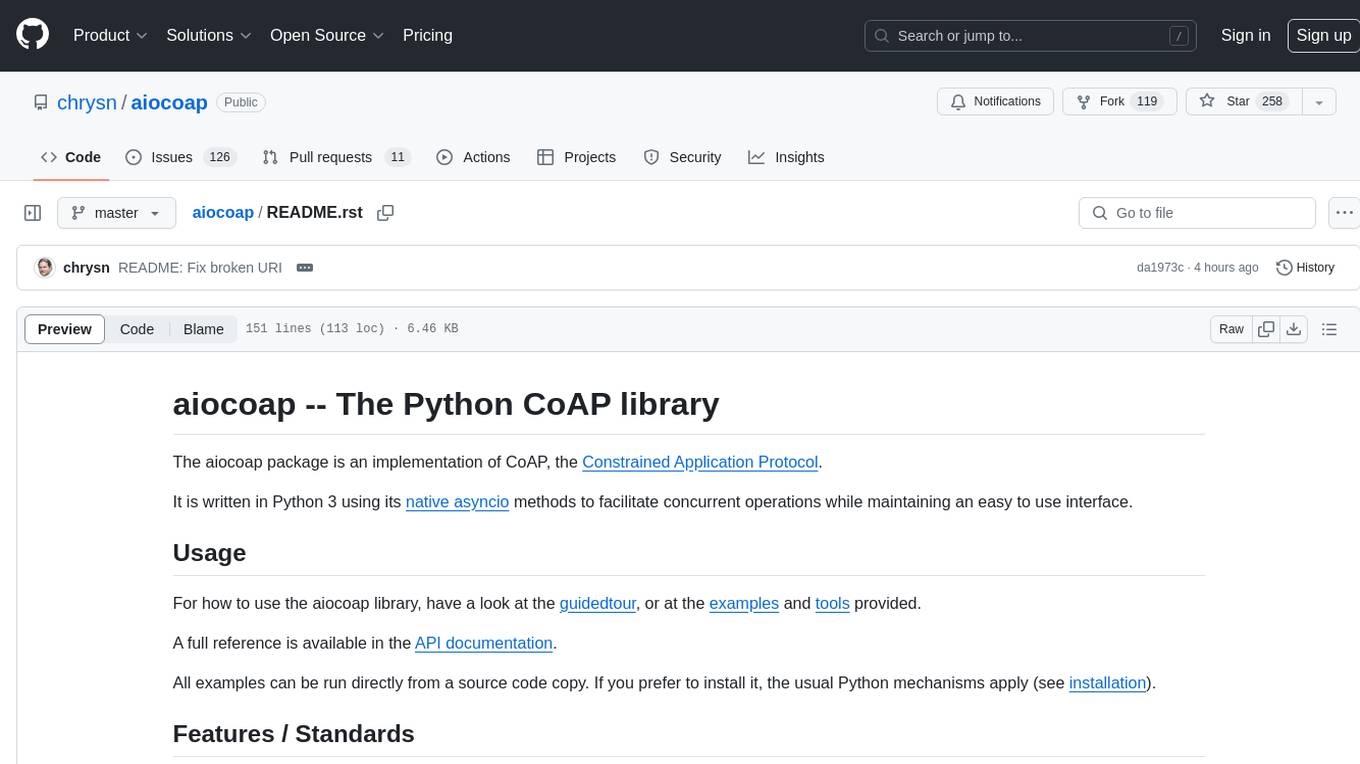
aiocoap
aiocoap is a Python library that implements the Constrained Application Protocol (CoAP) using native asyncio methods in Python 3. It supports various CoAP standards such as RFC7252, RFC7641, RFC7959, RFC8323, RFC7967, RFC8132, RFC9176, RFC8613, and draft-ietf-core-oscore-groupcomm-17. The library provides features for clients and servers, including multicast support, blockwise transfer, CoAP over TCP, TLS, and WebSockets, No-Response, PATCH/FETCH, OSCORE, and Group OSCORE. It offers an easy-to-use interface for concurrent operations and is suitable for IoT applications.

CPP-Notes
CPP-Notes is a comprehensive repository providing detailed insights into the history, evolution, and modern development of the C++ programming language. It covers the foundational concepts of C++ and its transition from C, highlighting key features such as object-oriented programming, generic programming, and modern enhancements introduced in C++11/14/17. The repository delves into the significance of C++ in system programming, library development, and its role as a versatile and efficient language. It explores the historical milestones of C++ development, from its inception in 1979 by Bjarne Stroustrup to the latest C++20 standard, showcasing major advancements like Concepts, Ranges library, Coroutines, Modules, and enhanced concurrency features.
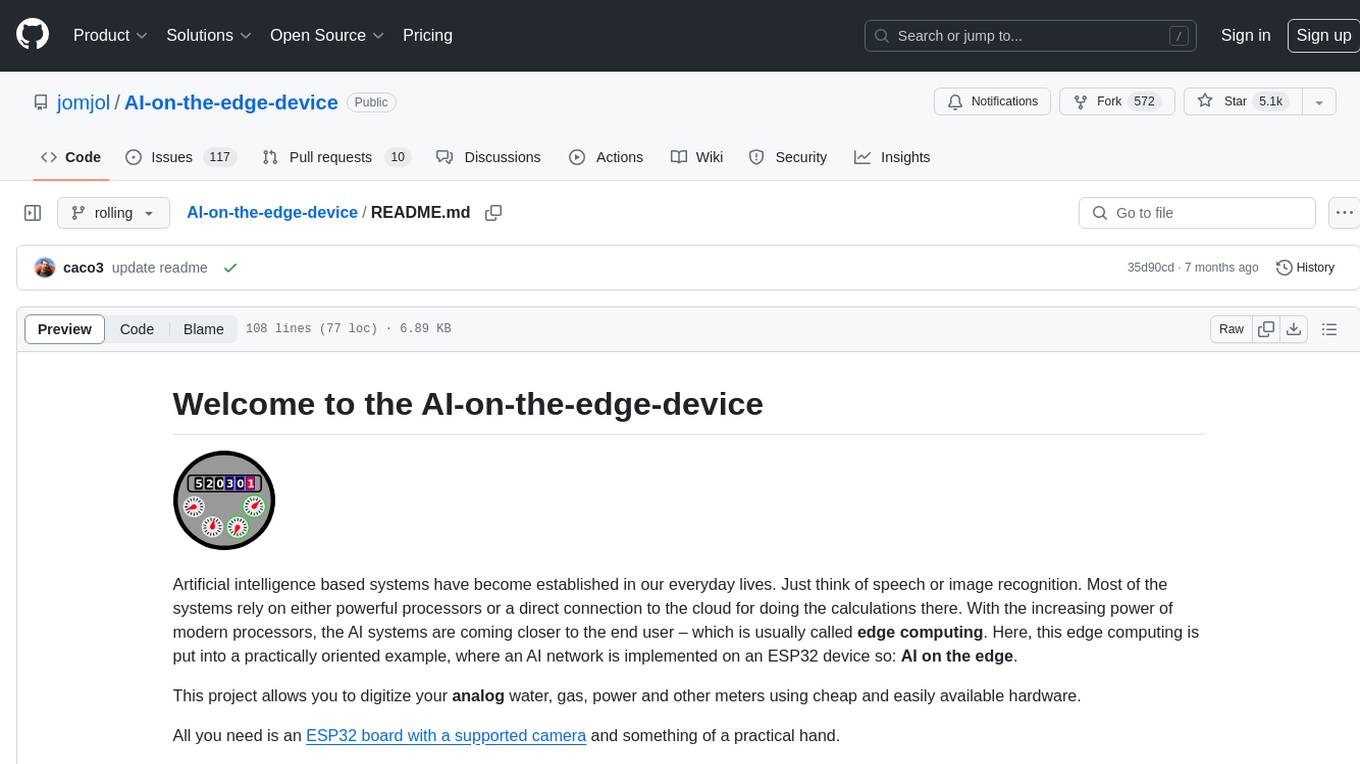
AI-on-the-edge-device
AI-on-the-edge-device is a project that enables users to digitize analog water, gas, power, and other meters using an ESP32 board with a supported camera. It integrates Tensorflow Lite for AI processing, offers a small and affordable device with integrated camera and illumination, provides a web interface for administration and control, supports Homeassistant, Influx DB, MQTT, and REST API. The device captures meter images, extracts Regions of Interest (ROIs), runs them through AI for digitization, and allows users to send data to MQTT, InfluxDb, or access it via REST API. The project also includes 3D-printable housing options and tools for logfile management.
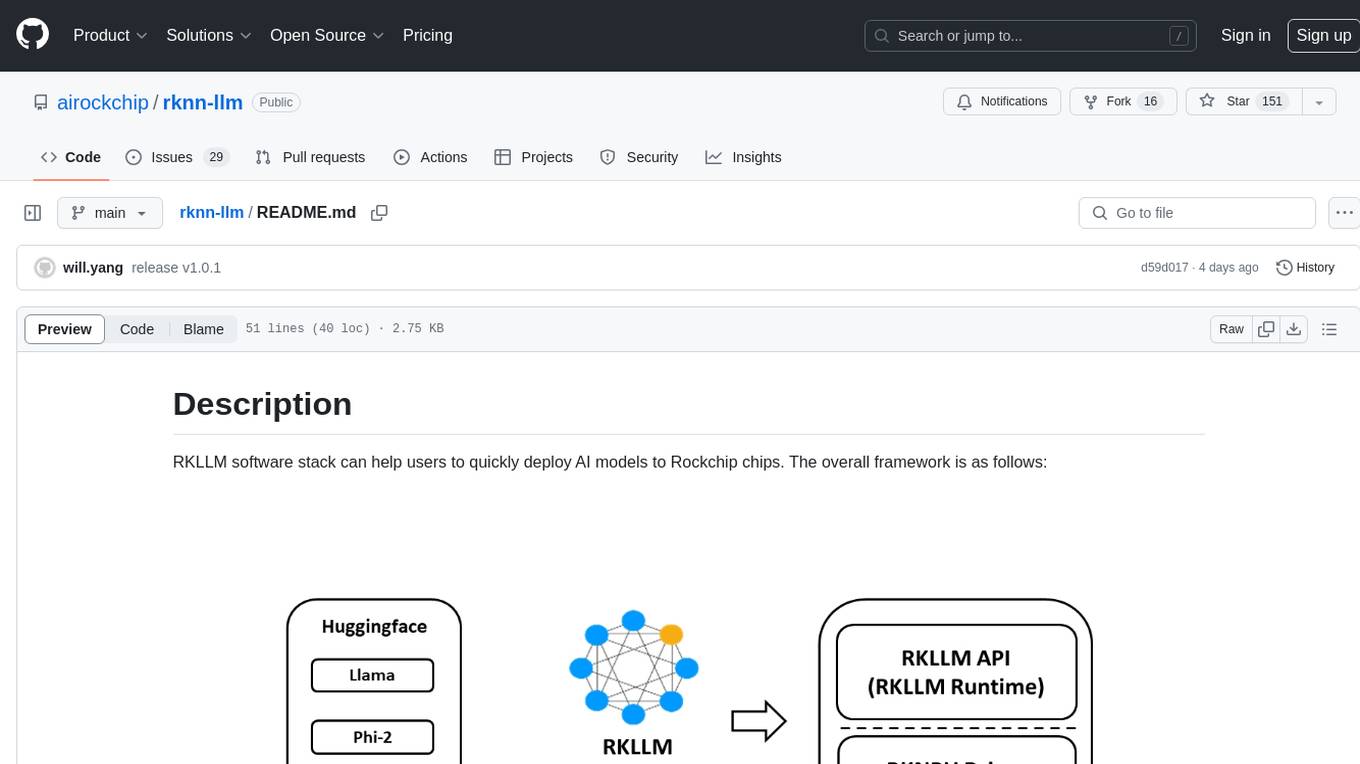
rknn-llm
RKLLM software stack is a toolkit designed to help users quickly deploy AI models to Rockchip chips. It consists of RKLLM-Toolkit for model conversion and quantization, RKLLM Runtime for deploying models on Rockchip NPU platform, and RKNPU kernel driver for hardware interaction. The toolkit supports RK3588 and RK3576 series chips and various models like TinyLLAMA, Qwen, Phi, ChatGLM3, Gemma, InternLM2, and MiniCPM. Users can download packages, docker images, examples, and docs from RKLLM_SDK. Additionally, RKNN-Toolkit2 SDK is available for deploying additional AI models.
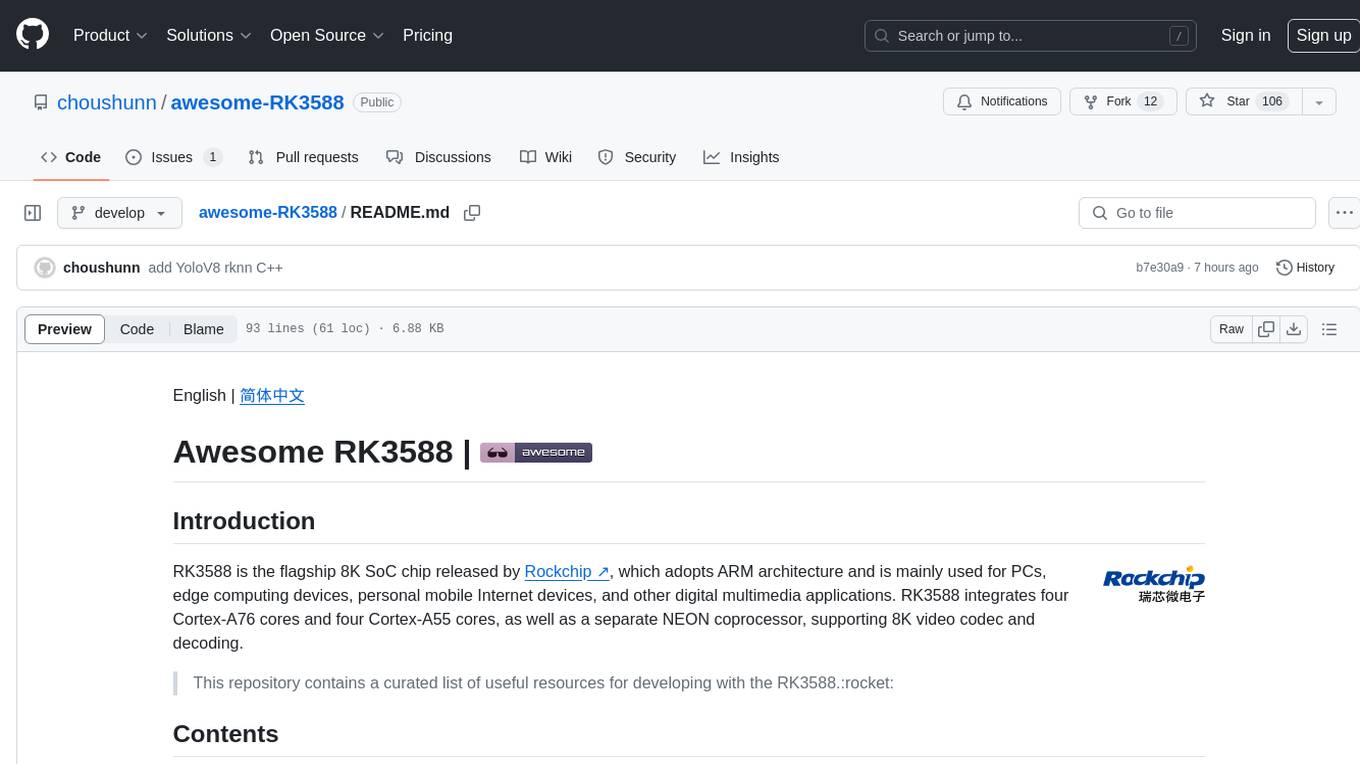
awesome-RK3588
RK3588 is a flagship 8K SoC chip by Rockchip, integrating Cortex-A76 and Cortex-A55 cores with NEON coprocessor for 8K video codec. This repository curates resources for developing with RK3588, including official resources, RKNN models, projects, development boards, documentation, tools, and sample code.







